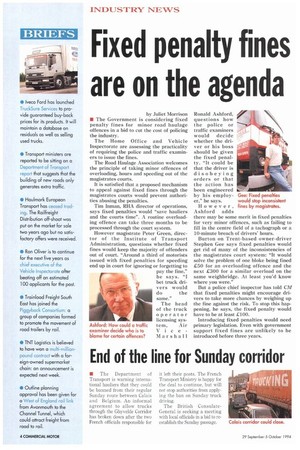Fixed penalty fines are on the agenda
Page 6

If you've noticed an error in this article please click here to report it so we can fix it.
by Juliet Morrison • The Government is considering fixed penalty fines for minor road haulage offences in a bid to cut the cost of policing the industry.
The Home Office and Vehicle Inspectorate are assessing the practicality of requiring the police and traffic examiners to issue the fines.
The Road Haulage Association welcomes the principle of taking minor offences of overloading, hours and speeding out of the magistrates courts.
It is satisfied that a proposed mechanism to appeal against fixed fines through the magistrates courts would prevent authorities abusing the penalties.
Tim Inman, RHA director of operations, says fixed penalties would "save hauliers and the courts time". A routine overloading offence can take three months to be processed through the court system.
However magistrate Peter Green, director of the Institute of Transport Administration, questions whether fixed fines would keep the majority of offenders out of court. "Around a third of motorists issued with fixed penalties for speeding end up in court for ignoring or forgetting to pay the fine," he says. "I bet truck drivers would do the same."
The head of the truck operator licensing sys tem, Air Vice Mar sha II Ronald Ashford, questions how the police or traffic examiners would decide whether the driver or his boss should be given the fixed penalty. "It could be that the driver is disobeying orders or that the action has been engineered by his employer," he says.
However, Ashford adds there may be some merit in fixed penalties for very minor offences, such as failing to fill in the centre field of a tachograph or a 10-minute breach of drivers' hours.
Burton on Trent-based owner-driver Stephen Gee says fixed penalties would get rid of many of the inconsistencies of the magistrates court system: "It would solve the problem of one bloke being fined £50 for an overloading offence and the next £300 for a similar overload on the same weighbridge. At least you'd know where you were."
But a police chief inspector has told CM that fixed penalties might encourage drivers to take more chances by weighing up the fine against the risk. To stop this happening, he says, the fixed penalty would have to be at least £100.
Introducing fixed penalties would need primary legislation. Even with government support fixed fines are unlikely to be introduced before three years.




























































































